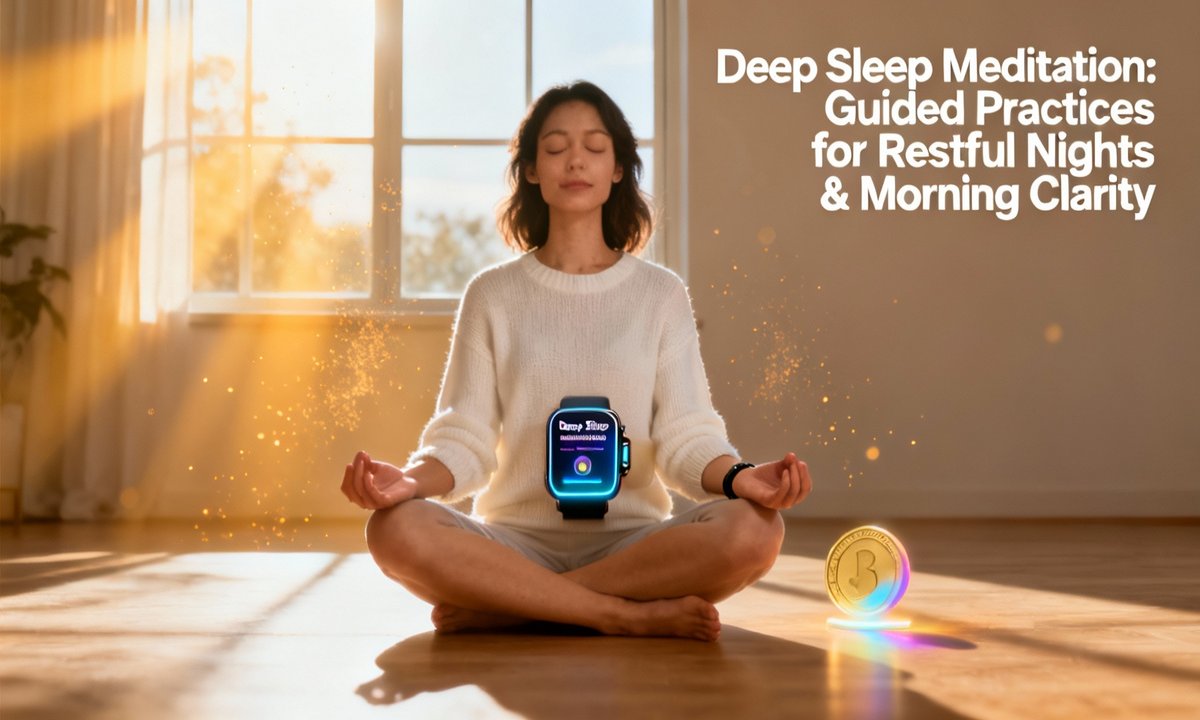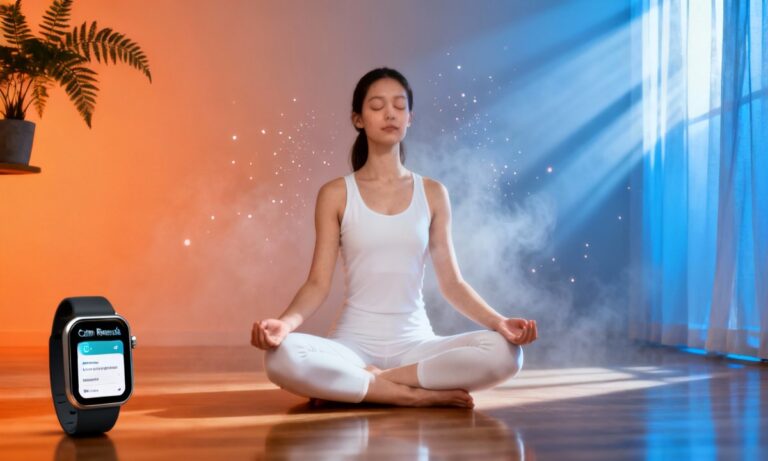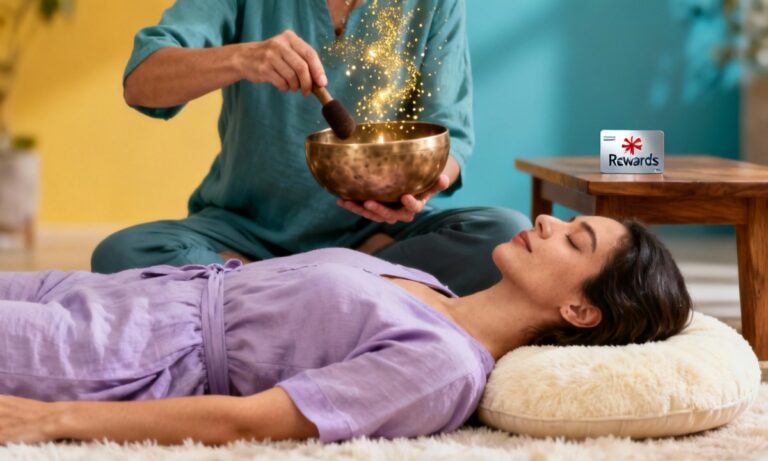For those experiencing restless nights or seeking to awaken truly refreshed and mentally sharp, deep sleep meditation presents a gentle, natural path to profound restoration. Across the United States, a growing number of individuals are turning to guided sleep meditation routines, embracing them as a preferred, non-pharmaceutical approach for achieving better rest and clearer mornings.
Understanding Deep Sleep Meditation
Deep sleep meditation involves various guided techniques specifically designed to help you transition effortlessly into sleep. These practices often feature calming audio narration that guides listeners through focused breathing, detailed body scans, soothing visualizations, and even moments of gratitude. Such methods are widely recognized for their role in fostering mindfulness and providing relief from insomnia.
These meditations diverge from traditional mindfulness practices by focusing on the moments immediately before bedtime. As you lie comfortably, a guide provides scripted cues that encourage deep relaxation, easing both physical and mental tension. This deliberate engagement of the parasympathetic nervous system naturally slows your heart rate, deepens your breath, and activates the body’s innate signals for sleep.
Physiologically, guided sleep meditations work by stimulating the vagus nerve, which helps the body shift from a state of stress into a state of rest. This process enables individuals to disengage from persistent thought loops and anxiety, effectively priming themselves for truly restorative sleep. Numerous online resources offer excellent examples of these powerful practices.
The Benefits of Guided Sleep Meditation
Consistently incorporating deep sleep meditation into your routine is linked with notable improvements in both physical and mental well-being. Scientific research indicates gains such as an increase in overall sleep time and a significant enhancement in sleep quality. Furthermore, these practices have been shown to reduce both stress and non-clinical anxiety levels.
Studies highlight that techniques like Yoga Nidra and breath-focused meditation can dramatically decrease stress and potentially triple the duration of deep sleep stages. Users frequently report falling asleep more quickly, experiencing fewer awakenings during the night, and achieving a smoother transition from an active mind to a peaceful body. These positive shifts often lead to enhanced overall resilience and a greater sense of personal control when managing daily stressors.
After years of struggling with restless nights, many individuals find that guided sleep meditation becomes a reliable anchor, allowing them to rest soundly and greet each day with renewed clarity.
Morning Clarity: The Link Between Sleep and Daily Function
Achieving better sleep extends far beyond nighttime peace; it is directly connected to how you feel and function throughout the following day. Quality sleep, cultivated through deep sleep meditation, is crucial for strengthening memory, improving decision-making abilities, and maintaining emotional balance.
Waking up truly refreshed empowers you with greater focus and optimism, making even demanding days feel more manageable. Those who regularly incorporate meditation for better sleep frequently report sharper cognitive skills and a more positive outlook. By gently clearing away mental clutter before bed, you are more likely to awaken with a sense of clarity and motivation, which positively impacts professional performance, parenting, or creative pursuits.
Establishing a consistent nighttime meditation routine paves the way for a regular wake time and more reliable energy levels throughout your day. Even a brief body scan, a moment of gratitude, or a guided visualization before bed can create significant positive momentum for the morning.
Simple Steps to Begin Your Meditation Practice
Curious about how to begin your journey? Here is a straightforward sleep and relaxation technique you can try tonight to foster deeper rest.
Preparing for a Restful Night
First, cultivate an optimal environment for sleep. Select a quiet space, dim the lights, and ensure your bed is as comfortable and inviting as possible. This preparation sets the stage for a truly effective meditation experience.
Guided Techniques for Relaxation
Begin with controlled breathing: inhale deeply through your nose for a count of four, hold briefly, then slowly exhale. Next, perform a body scan, starting from your scalp and progressively allowing each muscle to relax as you move down to your toes. Then, engage in guided visualization; imagine a tranquil scene, such as gentle waves on a shore or clouds drifting peacefully, letting the imagery deepen your serenity.
Follow this with a gratitude reflection, focusing on one thing you are thankful for to reinforce positive feelings as you drift. Finally, practice letting go; if your mind wanders, gently bring your attention back to your breath or the guide’s voice. Welcome tiredness without trying to force or resist sleep.
You can find sample audio meditations for these routines through various trusted online platforms.
Maximizing Your Deep Sleep Meditation Experience
Certain simple habits can significantly enhance your meditation routine, leading to even greater results and more consistent restful nights.
Essential Tips for Consistent Practice
To gain the best effects, strive for consistency by practicing deep sleep meditation at the same hour each night. Optimize your sleeping environment by reducing electronics and light exposure before bed; consider using blackout curtains or an eye mask. Patience is key; do not be discouraged if sleep does not come instantly, as the cumulative effect of consistent practice is most important.
Additionally, uphold healthy sleep hygiene by avoiding caffeine and alcohol close to bedtime, keeping your room cool and quiet, and adhering to a regular sleep schedule. A gentle wind-down routine 30 minutes before bed, perhaps involving herbal tea, dim lights, and a five-minute gratitude reflection, can perfectly set the stage for effective sleep meditation.
The Science Behind Meditation and Restful Sleep
Research into meditation for better sleep continues to expand, with clinical trials and self-reported studies consistently demonstrating lasting benefits for practitioners. Key findings highlight several significant gains from guided meditation, Yoga Nidra, and focused breathwork.
Key Scientific Findings
Studies show a reduction in sleep latency, meaning individuals fall asleep faster compared to control groups. There are also reported increases in Stage 3, or slow-wave sleep, which is the phase most crucial for bodily repair and memory consolidation. Consistent users often experience lower night awakenings, leading to improved overall sleep satisfaction. Furthermore, measurable stress hormones have been shown to decrease significantly, alongside improvements in coping mechanisms.
While integrating these meditation-based sleep habits can greatly assist with anxiety and emotional regulation, individuals experiencing chronic insomnia or other severe sleep disorders are encouraged to seek professional medical care for tailored guidance and treatment.
Inspiring Journeys: Real-Life Success Stories
The experiences of real users powerfully illustrate the profound value of incorporating guided meditation for sleep into their daily lives.
Many describe the practice as transformative, providing them with the tools to guide their minds to a peaceful state, even on challenging nights. This newfound ability fosters greater confidence in facing stressful days, knowing that restorative rest is once again within reach. Others, initially skeptical, have found that with regular practice, they now fall asleep faster and, for the first time in years, no longer rely on sleep aids.
If deep sleep meditation has brought positive changes to your life, consider sharing your journey with others in the community.
Discovering Deep Sleep Meditation Resources
Starting your journey with deep sleep meditation has been made incredibly simple through a wealth of online platforms and mobile applications. Here are some trusted resources that offer both free and premium guided meditation practices.
Platforms like Headspace provide a variety of Sleepcasts and bedtime meditations tailored for rest. The Mindful Movement on YouTube offers a popular channel featuring a wide array of deep sleep meditations. Additionally, Chibs Okereke Meditations on YouTube presents routines specifically focused on stimulating the vagus nerve for profound rest. Insight Timer hosts an extensive free library, including the highly regarded “Deep Sleep Meditation by Andrew Johnson.” Explore these diverse options to discover a guide and style that genuinely resonates with your needs, and try several to find what works best for you.
Expert Insights on Breath and Relaxation
A profound connection exists between your breath and your nervous system. By consciously utilizing your breath as a tool, you can actively engage with your autonomic nervous system, guiding your body into a deep state of relaxation.
Breath is fundamental to the effectiveness of deep sleep meditation. It is not merely about quieting the mind, but rather about naturally shifting the entire physiology from a state of alertness to one of complete restfulness, directing every muscle and neuron toward stillness.
Further Exploration and Community Engagement
If you are eager to delve deeper into the world of restful sleep and mindfulness, numerous resources are available for continued learning.
For even more in-depth resources, you can visit our Wellness & Sleep section, which offers a collection of related articles and downloadable guides to support your journey.
You can further enhance your journey by exploring various options: Download Free Sleep Meditation, Subscribe for More Guided Practices, or Join Our Sleep Wellness Newsletter. These avenues allow you to discover new guides, download meditations, and sign up for updates to keep your path to better sleep on track.
Important Disclaimer
This feature offers information solely for general wellness purposes and should not be considered a substitute for professional medical advice. Individuals who experience chronic insomnia or other sleep disorders are strongly encouraged to consult with healthcare professionals for appropriate diagnosis and treatment.



